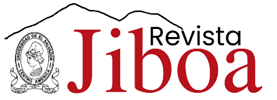
ISSN: 3078-6150
e-ISSN: 3078-6169
The Jiboa Journal is guided by the academic principles established by the University of El Salvador, as established in Article 3 of its Organic Law, which include:
Mission: The University of El Salvador is a public and autonomous higher education institution, scientific, critical, participatory, democratic, and committed to comprehensive national development. It aims to form professionals of high human, scientific, and technological quality, with a focus on the environment and life in all their forms and manifestations, as well as on the production and contextual application of knowledge through the integrated practice of teaching, research, and social projection.
Vision: To be the public and autonomous university that leads higher education in the country, with national and international educational leadership. Its innovative training of entrepreneurial professionals of the highest quality, along with the production of scientific and technological knowledge, enables it to be a democratic and critical actor in socio-educational changes, leading to the construction of a developed, just, educated, sustainable, scientific, and secure society.
The Code of Ethics of the University of El Salvador, in Article 5, establishes the ethical values that should govern the conduct of those who are part of the university community. These values are:
Jiboa Journal, as an academic-scientific publication of the Paracentral Multidisciplinary Faculty of the University of El Salvador, adopts and promotes ethical principles during all stages of the editorial process. These principles are based on the guidelines established by the Committee on Publication Ethics (COPE), including its Code of Conduct and Core Practices, as well as on the good practices recommended by the Council of Science Editors (CSE).
The ethical guidelines that govern the participation of the different authors involved in the publication process are established below:
For authors:
For Reviewers:
For Editors:

ISSN: 3078-6150
e-ISSN: 3078-6169
Ing. MSc. Jossue Humberto Henríquez Garcia
0009-0005-6447-4314
Ing. MSc. Benigna Lorena Martínez de Guzmán
0000-0001-7538-9864
Lic. MSc. Luis Ernesto Paz Quintanilla
0009-0002-8366-4074
Ing. MSc. Sandra Verónica Rodríguez Domínguez
0009-0002-5975-4379
Revista Jiboa
ISSN:3078-6150 e -ISSN: 3078-6169
Dirección:
Final Av. Crescencio Miranda, contiguo a Cruz Roja Salvadoreña
Universidad de El Salvador
Facultad Multidisciplinaria Paracentral
San Vicente, El Salvador, América Central
Correo: revista.jiboa@ues.edu.sv
Enlaces: Sitio web


